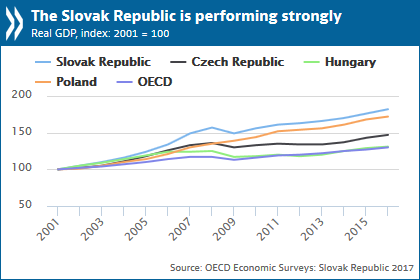Slovak Republic: Strong economy offers opportunity to invest in the future
The Slovak Republic continues exhibiting robust economic performance, with strong growth backed by a sound financial sector, low public debt and high international competitiveness drawing on large inward investment. Policymakers should take advantage of the current situation to enact reforms that will further increase living standards of all Slovaks, according to a new report from the OECD.

The latest OECD Economic Survey: Slovak Republic discusses the short-term challenges facing the country as well as how solutions can help make growth sustainable and more inclusive over the longer-term. The Survey, presented in Bratislava by OECD Secretary-General Angel Gurria, Slovak Republic Prime Minister Robert Fico and Minister of Finance Peter Kažimír, identifies priority areas for reforming the public sector and boosting skills, employment and productivity.
“The Slovak economy has been one of the most dynamic and competitive in the OECD for many years, and this performance is expected to continue,” Mr Gurría said. “Despite the impressive achievements in creating jobs, maintaining low levels of poverty and improving environmental protection, challenges persist. There is still much that can be done to ensure a more sustainable and inclusive society for future generations, notably by improving educational outcomes and skills and boosting quality and efficiency of health care services.”
The Survey underlines the urgent need to address the needs of those that have been left behind during the long economic expansion. It shows that long-term unemployment is still very high, with more than 60% of the unemployed out of work for more than a year. It notes that the Roma community remains poorly integrated, with extremely low educational outcomes, employment rates of just 25%, compared to the national average of 70%, and life expectancy that is 20 years less than for the non-Roma population. The report also highlights that regional disparities are among the highest in the OECD.
Fostering inclusiveness and well-being will require a range of structural reforms to improve the public sector and ensure better service delivery, the Survey says. This should include tighter oversight of public spending efficiency and education sector reform, including higher teacher salaries, more teaching assistants and conditional cash transfers to disadvantaged families, contingent on pre-school attendance.
“Improving public sector governance remains paramount,” Mr. Gurría said. Important progress has been recently achieved to improve tax collection and foster public sector efficiency, with the so-called “Value-for-Money Initiative.” However more needs to be done to further curb tax evasion, the Survey notes.
In this context, Mr. Gurría welcomed the joint project of the Slovak Republic and the OECD to promote integrity and fight corruption. In the first phase of this collaboration, the OECD conducted an Assessment of key anti-corruption related legislation in the Slovak Republic. The report welcomes that the Slovak Republic has joined a growing number of OECD countries to enact a comprehensive whistle-blower protection law. To make the law more effective, the report recommends expanding its scope to cover all public servants and providing appropriate incentives and training for reporting misconduct.
With population ageing likely to put further pressure on the health care system, the Survey recommends the Slovak Republic further rationalise health care spending, through improved hospital financing structures, better procurement systems, expansion of the fee-for-service payment system for General Practitioners and an expansion of long-term care provision.
The Survey recommends a range of reforms to improve environmental performance, including the removal of subsidies for some coal-fired power generation facilities and shifting the tax burden from labour to harmful environmental activities.
Source: Organization for Economic Co-operation and Development
- 330 reads
Human Rights
Conscience, Hope, and Action: Keys to Global Peace and Sustainability

Ringing FOWPAL’s Peace Bell for the World:Nobel Peace Prize Laureates’ Visions and Actions

Protecting the World’s Cultural Diversity for a Sustainable Future

The Peace Bell Resonates at the 27th Eurasian Economic Summit

Puppet Show I International Friendship Day 2020

